What Does It Really Mean to Have a Croatian Identity?
July 11, 2022 - Passport, residence, language... when it comes to Croatian identity, what really builds it? After almost three years living in Croatia, I ask myself some questions.
Not long ago, I agreed to help a master's student with her thesis, in which she sought to learn more about South Americans of Croatian ancestry and how the experience of studying the Croatian language in Croatia has helped them forge a kind of Croatian identity. For those not so familiar, the Croatian Government offers a Croatian language study scholarship through the Central State Office for Croats Abroad, in which people who have completed secondary education and who belong to the Croatian community in one way or another, can travel to five Croatian cities (Zagreb, Split, Rijeka, Osijek and now Zadar) to learn more about the country's language and culture. The experience also allows them to explore their roots further, and even presents them with an excellent opportunity to resolve issues related to their citizenship, passport, and more.
Having studied two semesters in Rijeka and one in Zagreb, and being only a few months away from completing three years living in Croatia, I thought that my experiences and anecdotes could be useful for her research. I can now say that for me it was a very introspective conversation. I don't remember the last time I asked myself so many questions about my experience in Croatia so far, or even about my own identity. One of the questions was: ''What makes you feel Croatian?'' I didn't mean to downplay that question, but my answer was simple: ''I'm not Croatian. I am Peruvian''. It makes one wonder, what exactly makes a Croatian identity? What does it really consist of? It may be several factors, such as the following:
Croatian ancestry
I have met many people throughout the years who told me about how their Croatian-born parents taught them about the country they come from or told me about the Croatian dishes and delicacies that their grandparents prepared at home. It's something that, as a sixth-generation Croatian, I couldn't understand unless I was told about it. Little do we know about my ancestor's life and his reasons for leaving Croatia. Over time we have learned that he died young when his son was just a child. And that son grew up and had his own family, and he also died when his son was very young. Thus, in future generations, the sense of belonging was lost or simply ignored.
In my case, and surely for many like me, the only thing we knew was that our last name is Croatian... and that is it. If we really wanted to get more familiar with those roots, it depended a lot on our own will or interest in learning more. Sometimes it seems that the less you know, the less you identify with a place.
Croatian citizenship
My father obtained Croatian nationality for himself, my siblings, and me when we were still little. Back then it was easier than it is now. Although we didn't know much about Croatia, when we got older we realised the difference between knowing the origin of your last name and having the Croatian Government officially recognise your ancestry. You'd think it wouldn't make much of a difference if you'd never left your own country, but somehow I thought it was a great way to pay tribute to my ancestor by acknowledging his own legacy.
Croatian passport
I didn't have a Croatian passport until I was 23 years old. Being from Peru, the only two feasible ways to obtain it were in Croatia (with the condition of being there during the length of time the process takes) or with an appointment at the Croatian Embassy in Chile. We didn't opt for any of those alternatives because we didn't see the need, during all these years, to have a passport. Suddenly we were presented with an opportunity to obtain a Croatian passport in our own country, and even without fully understanding the advantages beyond the obvious ones, we didn't even think twice.
There are many ways to answer the question, ''Where are you from?'' Some say, ''I'm from Argentina'', and others ''are from Australia''. Just as there are those who say that "they were born in Chile.'' But something I have also heard is from those who respond "I have a Croatian passport" to explain that they also have that citizenship. The passport, in addition to being a travel document that allows you to cross borders as a citizen of a particular country, has also been a symbol to show belonging to a nation. Although I felt like I had taken a big step towards knowing more about my roots the day I got mine, I also keep wondering if having the travel document of a country is enough to feel like part of it.
Residence in Croatia
In October it will be three years since I left everything to make Croatia my new home. This time has helped me understand that having residence in a country goes beyond having the police's permission to stay or even beyond owning or renting a square metre or two in a Croatian city. Living in Croatia involves becoming familiar with what surrounds you: public transport, shopping at the store, visiting the family doctor, walking the streets... all this has helped me feel that I'm adapting better and better to a new society. Having a Croatian ID in your wallet makes you feel there's now somewhere to call home. But is it enough?
Learn the Croatian language
For most, having the above is of little use if you don't know the language. In any case, having the ancestry, the citizenship, the passport or even living in Croatia, but not knowing the Croatian language, is like keeping that cultural gap wide open. There's a common misconception about Croatia as a country where you can get by only by speaking English. Although the majority of its local population speaks English, and very well, it could be said that it is merely a resource to facilitate communication with foreigners of all kinds. After studying the Croatian language for three semesters and empirically for another sixteen months, I still believe that my whole life in Croatia falls apart when I can't keep a conversation in Croatian afloat.
But having said all this, what is it then that makes you feel Croatian? Is it just one factor? Is it a combination of many? The only thing I know is that, at least for today, I'm far from being able to feel I have a Croatian identity.
I was born in Lima. I grew up there. My parents are Peruvian, as are my grandparents, as are my great-grandparents, and so on. The closest friends I've had since I was little are also Peruvian. I know the in-depth the history of my country, its many regions, its diverse cultures, and more. Although I'm adapting better and better to this country, I think I am very far from even considering myself Croatian. Furthermore, I believe that despite having citizenship, living here, having a passport, and learning the language, changing my identity is not something I'm looking for. Maybe its something that comes along naturally and is a process of its own.
For more news about the Croatian diaspora, visit our dedicated section.
Croatian Diaspora Book ''The Girl Who Left'' Earns Success in Australia
January 20, 2022 - The Croatian diaspora book ''The girl who left'' tells the story of Marija, a little girl from Blato who left her village to start a new life in Australia. The author is her daughter, Debra Gavranich. ''Ever since I was a child I have wanted to write my mother’s story. It is one of courage and hope''.
As years and decades go by, nostalgia and memories of the motherland begin to weigh more heavily, and the desire to pursue our origins and roots grows stronger. One of the most characteristic things about the Croatian diaspora is how far they have drifted from their country: Argentina, Chile, Canada, the United States, Peru, New Zealand, Australia, among others. We are talking about societies and geographies very different from those of their homeland. Nowadays, with so much distance both in space and time, how do they manage to get closer to the country in which their ancestors were born?
The first generations of Croats who emigrated kept the traditions of their families and their homeland and made sure to pass it on to their children, grandchildren, and great-grandchildren. But what really inspires us to value our Croatian ancestry are their stories and tales about their families, their homeland, and, of course, the tough decision to leave it all behind. Some have already made their lives in other parts of the world, but proudly celebrate their roots to this day. Others have returned to "our beautiful homeland" to honor their ancestors. Both perspectives are equally valuable in learning more about Croatia.
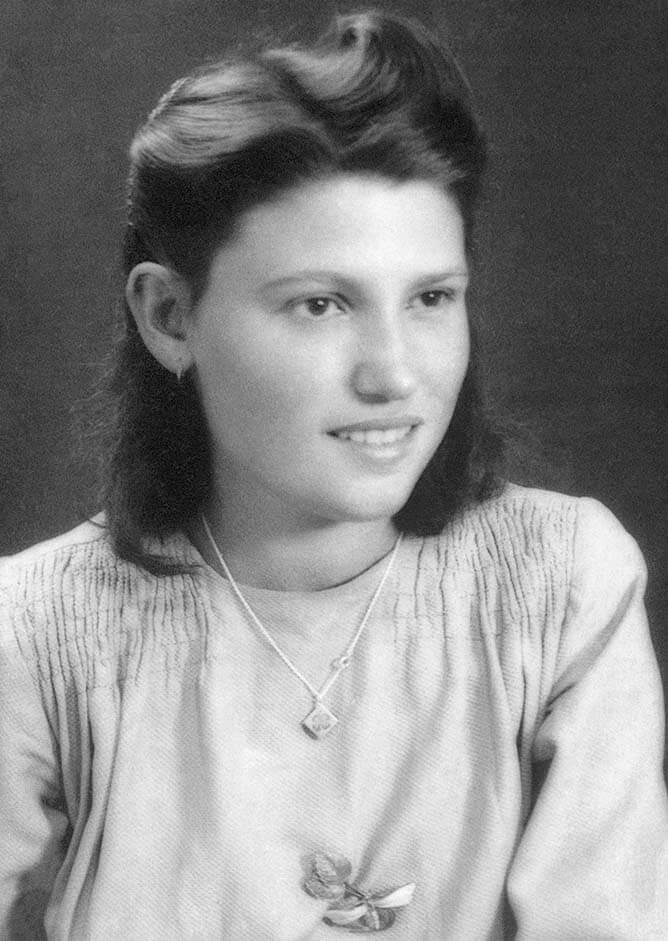
Portrait of Marija, Debra's mother.
The Croatian diaspora book ''The girl who left'', about Debra Gavranich's mother, Marija, is one of those stories that help celebrate Croatian heritage by sharing about the journey and experience of migration.
''My mother, Marija, was from Blato on the island of Korčula. Her childhood was impacted by the Second World War when her village was occupied by the Italians and then the Germans'', recalls Gavranich. ''Her older sister joined the Partisans as a code breaker for General Tito while Marija and her younger sister secretly helped the Partisans hiding in the hills. After the war, she agreed to a proxy marriage to my father, a sugar cane farmer in Australia. He had left the village as a child. A life in Australia with a husband she did not know was a risk worth taking and she left her family, friends, culture, and all she had known and traveled alone by ship to this foreign country. This is a story of a new migrant and the life she made for herself''.
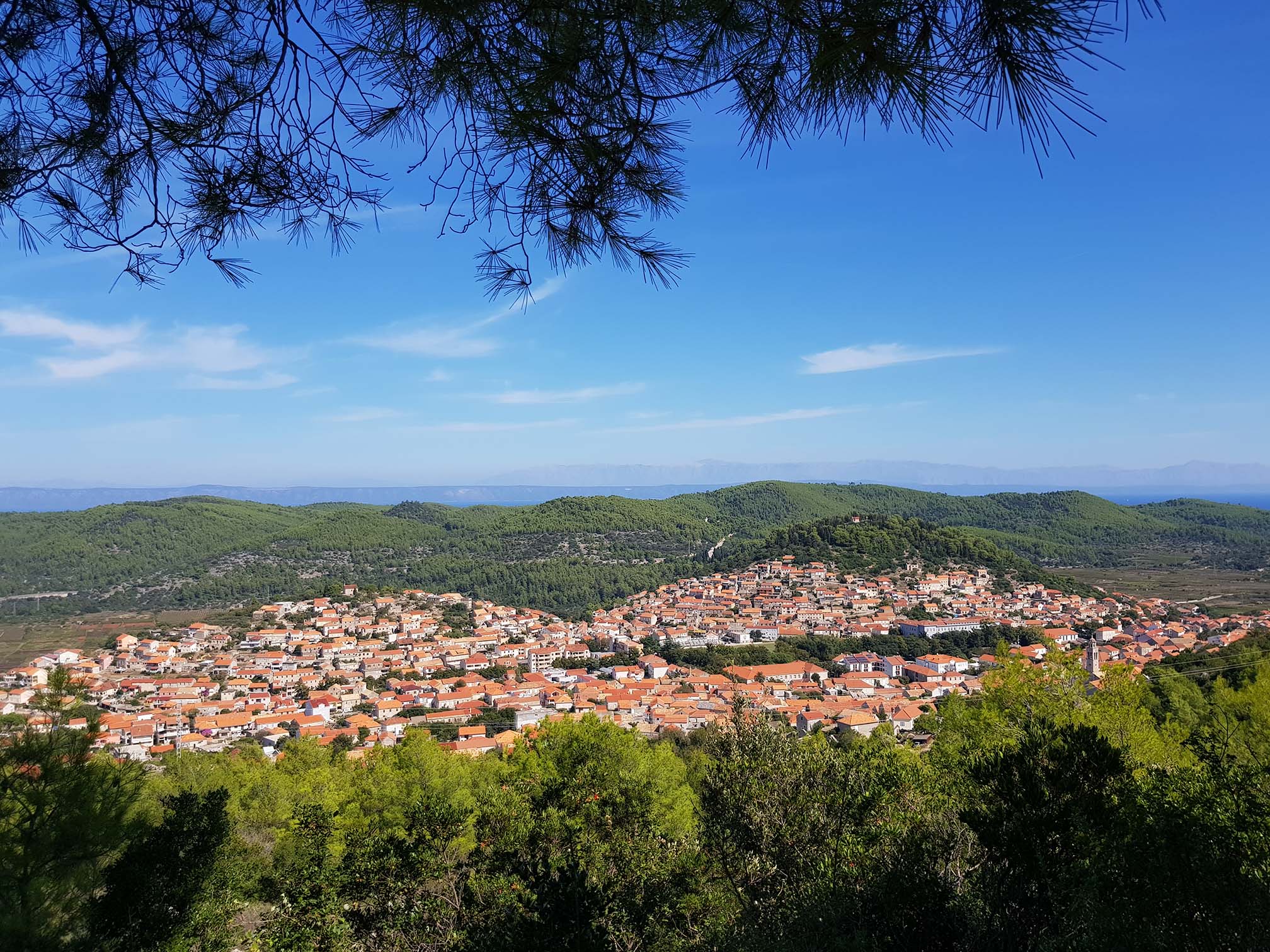
The town of Blato, on the island of Korčula; Marija's birthplace.
The Croatian diaspora book is called ''The girl who left'' and is published by Wild Dingo Press. It was released in August 2021 and has already sold thousands of copies. Aside from numerous launches in Australia, it was also launched in Blato, her mother's birthplace, on August 19th. ''There is a lot of interest in this book in Australia by the Croatian diaspora as well as the general public and the feedback has been wonderful'', adds Debra, who's been interviewed by several media. You can listen to her interviews with ABC Radio Australia from September 3rd, 2021, and September 24th, 2021.
''My publisher is currently searching for Croatian publishers so that this story can be translated and published in Croatia. I am hopeful. This story is representative of many of the Croatians that left their homeland and a little bit of their hearts behind as they made new lives in Australia'', says Debra.
To learn more about the Croatian diaspora, be sure to check our dedicated section.
Remembering Lieutenant Anthony Jovic, 20 Years After the 9/11 Attacks
September 9, 2021 - On the 20th anniversary of the attack on the World Trade Center, we remember the lives lost that fateful day, including that of Lieutenant Anthony Jovic, the son of Croatian immigrants, who died at age 39.
On a date like today, but 20 years ago, the world shook at the news of the terrorist attack on the Twin Towers in New York City. The shocking images went around the world live and on all the news on the planet. The world surely changed that day, and twenty years later the memory is still present. Moreover, after the recent events in Afghanistan, with the official withdrawal of US troops in Kabul and the installation of the new Taliban government, it has been weeks of reflection for people all over the planet after 20 years that ended a failed war.
But today, beyond the events that occurred as a consequence, serves to pay tribute to the civilians who lost their lives that day, as well as the hundreds of firefighters who tried to save them. In addition to the nearly 25,000 injured, the attack carried out by the terrorist organization Al Qaeda claimed a total of 2,977 victims, including 343 firefighters. And among those firefighters was Anthony Jovic.
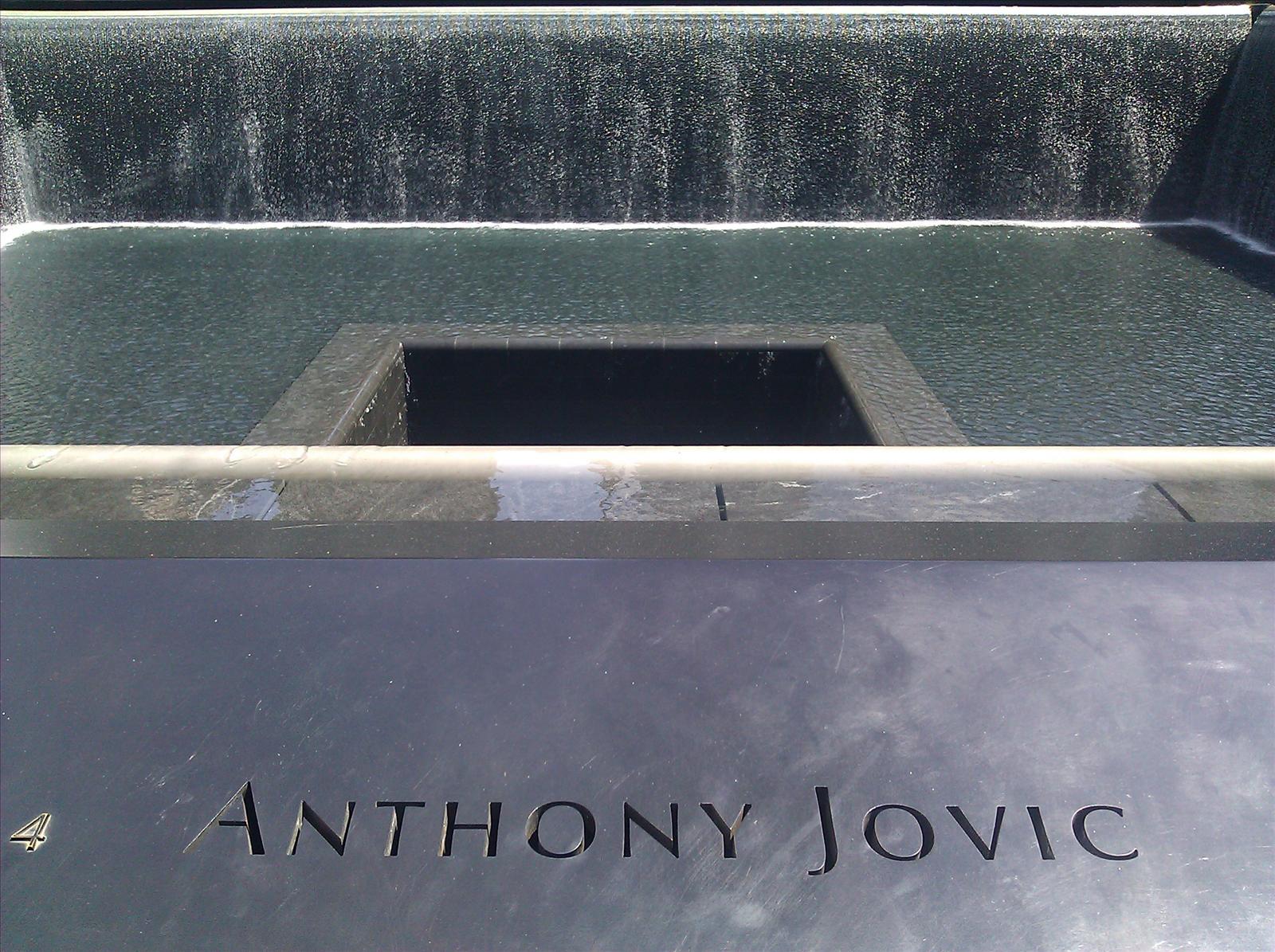
Anthony Jovic's name at Ground Zero (Photo: Richard Chemel)
Lieutenant Anthony Jovic, who considered himself an American Croat, was the son of Croatian immigrants and grew up in the Hell's Kitchen neighborhood of Manhattan, New York. He belonged to Battalion 47, Ladder 34, and was working in Engine 279. This article pays tribute without exception to all the victims, their families, and loved ones, as well as the New York Fire Department. But, in the following lines written by the Bravest Memorial Foundation, we remember Anthony in a special way, who that day had a day off, but did not return home on September 9, 2001, at age 39.
In those first weeks after Lt. Anthony Jovic disappeared with other members of Engine Co. 279 at the World Trade Center, his wife, Cynthia, concentrated on being strong for his two boys, Matthew, 10, and Peter, 9. So she had a little psychological trick she played on herself to keep going. "I'd say, 'He's working today. He's going to come home tonight,'" she recalled. "That night it would be, 'OK, he's working tonight, he's going to come home tomorrow.' Every day I'd tell myself the same thing."
It was because Cynthia Jovic can't imagine morning coffee without her husband of 16 years, a big kidder and hugger-and-kisser who never got through a day without several times telling her and the boys he loved them.
The son of a Croatian longshoreman who grew up in Hell's Kitchen, Jovic, 39, impressed all his friends as being smart enough to win the big one on "Jeopardy!".
The couple met in Manhattan when he was working at a butcher shop on Ninth Avenue and she, also a Croatian immigrant and longshoreman's daughter, was working at a deli nearby. When a cousin suggested they all go to an Irish pub in New Hyde Park, Jovic drove to pick her up in Manhattan in the most formal manner, allowing plenty of time to chat first with her mother and father at the house. For her old-fashioned European parents, his wife said, "it was love at first sight." For the couple, too. They married 2 1/2 years later.
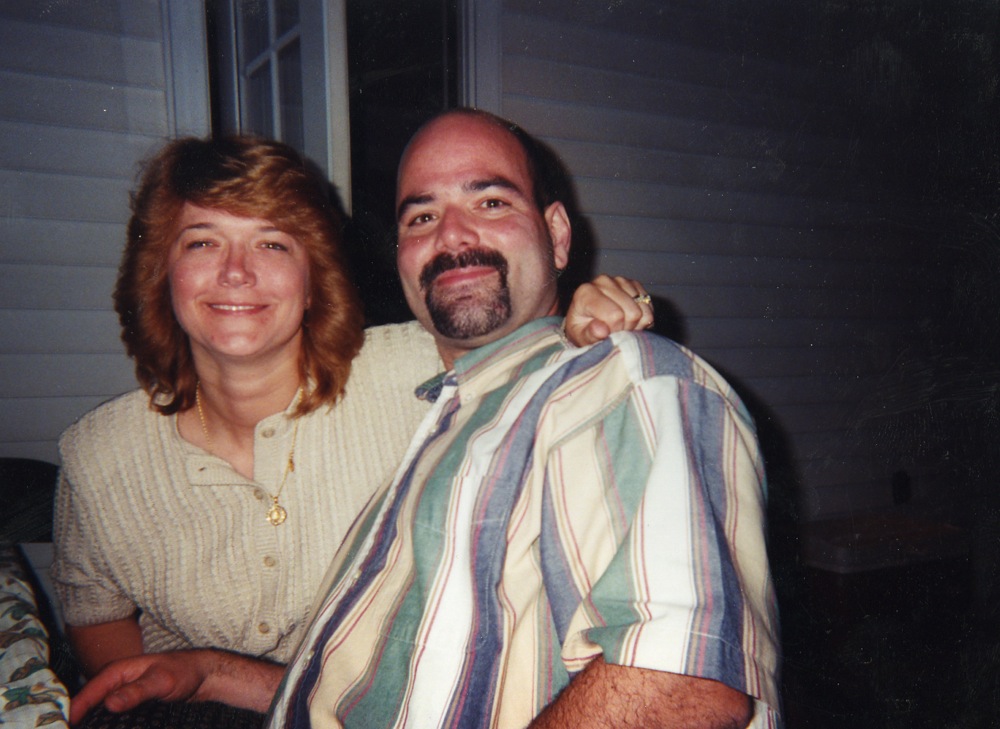
Anthony Jovic with wife Cynthia (Photo: Voices Center for Resilience)
Jovic joined the city fire department 12 years ago, about the time the family moved from Elmhurst to Massapequa Park. He was aiming high, and once he made lieutenant was already spending every free day he could find to prepare for the captain's exam, which he would have taken in October. When not working or studying, it was miniature golf, bowling, and lots of swimming with the family in the backyard pool. They were so close, she could finish his sentences for him.
"We were the happiest when we were together," she said. Cynthia Jovic was watching CNN on Sept. 11; she knew it was bad, because her husband was working with the company in Red Hook, Brooklyn, that day.
"When that [south] tower came down, his soul went right through me. I knew it then, he just went through me and I knew he was gone," she said. His burned and mangled shield turned up in the south tower in November, shortly before a memorial service was held, but no remains have been identified.
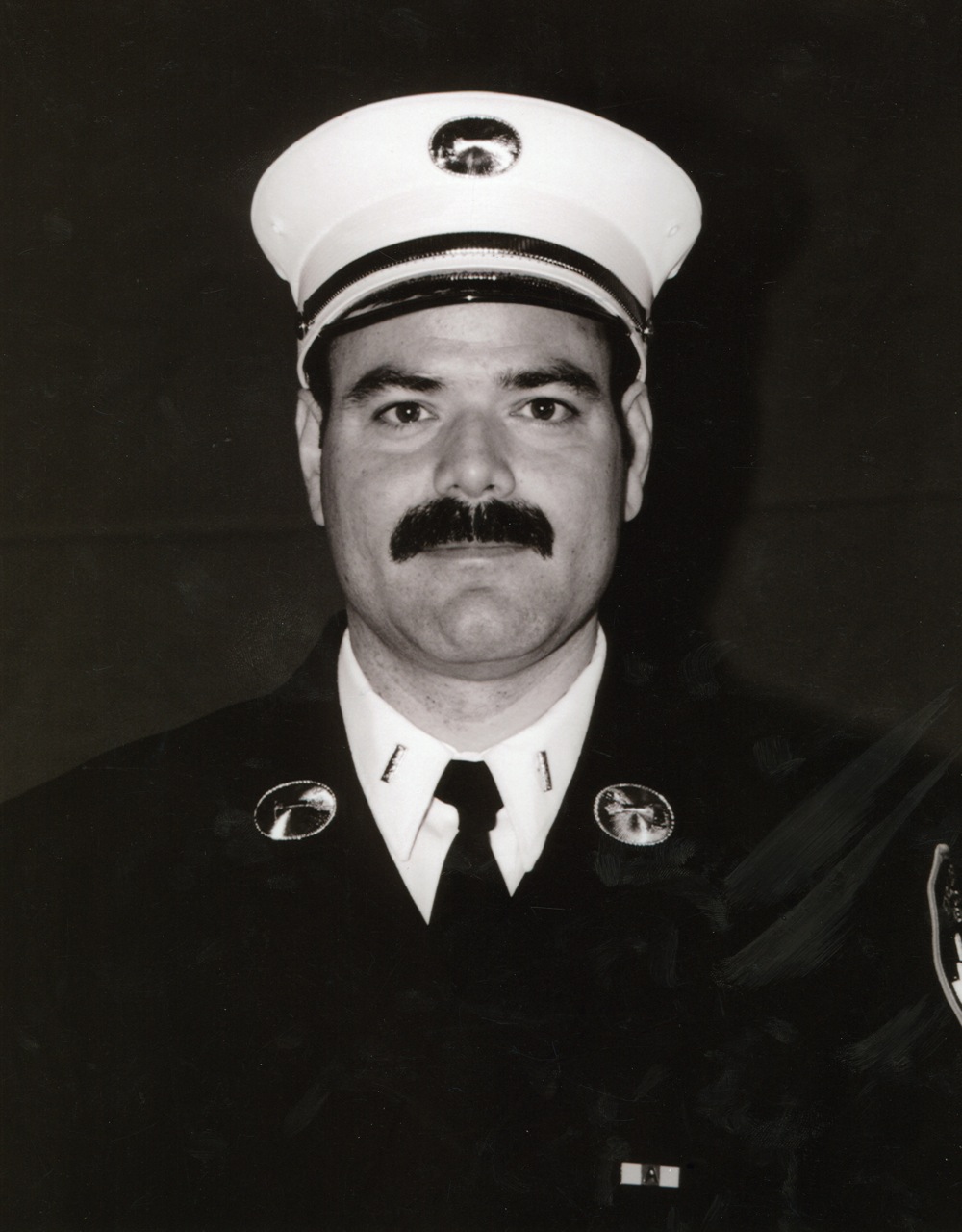
Lieutenant Anthony Jovic (Photo: Voices Center for Resilience)
The memory of that moment has become a source of warmth and comfort lately, now that it's no longer possible for her to pretend her husband is coming home tonight, or tomorrow morning, or the next day. Now, Cynthia Jovic knows, he's with her and the kids all the time. "He always told me, 'Every time they take an ID picture, I try to look nice, because you never know when they might be using it for a memorial.' I'll be honest with you, I think he looks wonderful in the picture that they have of him." (By Elizabeth Moore on Newsday, February 5, 2002)
Two years ago, on September 7, 2019, the New York Post reported that Anthony's eldest son, Matthew, had joined the Fire Department just as his father had, along with other 12 young New Yorkers who followed their parents' steps.
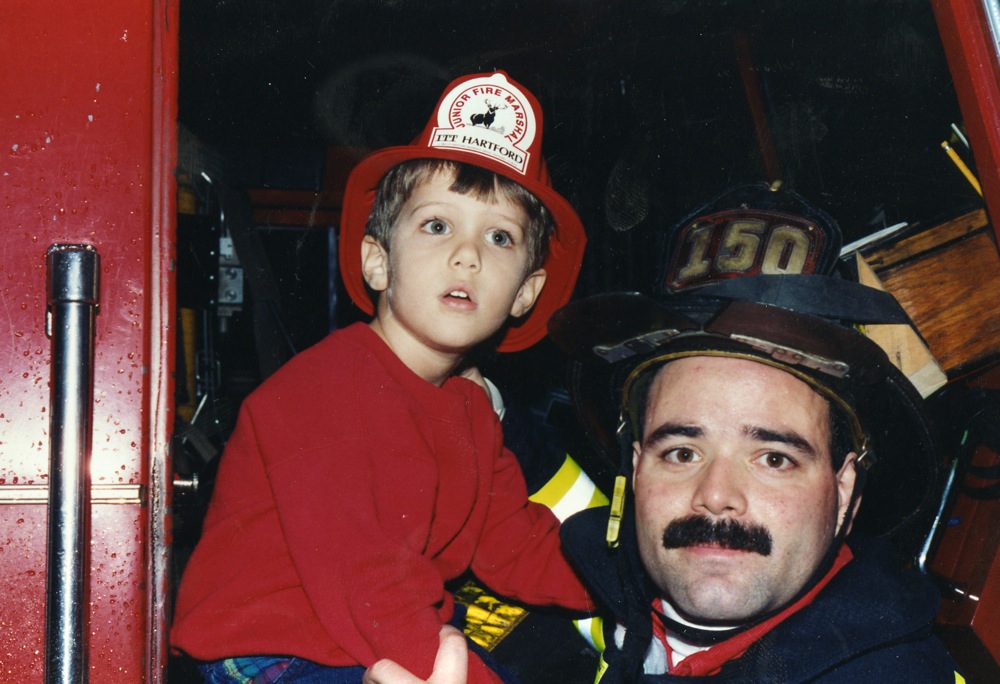
Anthony and his eldest son Matthew, who recently joined the New York Fire Department. (Photo: Voices Center for Resilience)
Our thoughts are with all those who, in one way or another, suffered and continue to suffer from the events that occurred twenty years ago.
For more about the Croatian Diaspora, visit our dedicated page here.
Croatian Diaspora in South America: The Story of Nadia from Argentina
June 17, 2021 - Reuniting with your Croatian ancestry can go in many ways. Many of the Croatian diaspora in South America tirelessly seek to trace their roots, and several of them without success. The chances of accidentally meeting your distant relatives are always low, but this is what surprisingly happened to Nadia from Argentina.
Every year, lists are written in media and blogs everywhere to rank Croatian destinations, facts, and people, but I don't know if it has occurred to anyone before that Croatia, in addition to its beaches, its islands, its nature, its Roman, Venetian, Austro-Hungarian, and Yugoslav heritage, its geniuses (both in science and sport) and more, Croatia could also be known for its surprises. It is true that being Croatian, of Croatian descent, or living in Croatia can surprise one on various occasions, and not always in a negative way.
Of course, there are known surprises that one can get when going to the police station to carry out a procedure, or when sitting at the table of a Croatian family at lunch, or after a rakija tasting. But some of its most interesting events happen when reconnecting with your Croatian ancestry. Not only through my own experience, but I know of many, many people over the years who have failed to find out more about their ancestors rather than the simple fact that they were Croats.
As the years go by, it becomes more difficult to connect the evidence that one finds to solve numerous questions such as the year their ancestor was born, where they were born, when did they leave Croatia, why did they leave Croatia, what did they do while living there, what did they do after arriving at their new country, and so on. This is very difficult to solve, especially for the large Croatian diaspora in South America, a distant continent in so many ways beyond what’s measurable. If there’s something I know, it is that one of the decisions that can facilitate this search is to return to the mother country. It is not a guarantee, but it can definitely bring you closer to the answer you are looking for.
But what if one is not looking for it? It does not mean that there is no type of interest, but precisely it ceases to be a priority when it becomes so difficult to know something about our origins. When you find something you were looking for, it always brings a pleasant sense of success and fulfillment. But when it is unexpected, the feeling of joy can be equal or even greater. This is what I thought when I first heard about Nadia's experience. But I feel like the story will feel more magical if it is shared through her own words. Meet Nadia Milevčić, a returnee from Argentina.
What country are you from and when were you born?
I am from Argentina, I was born in Buenos Aires in October 1994.
When did you know that you were of Croatian descent?
I can't give you an exact date because it's something I've known for as long as I can remember. Perhaps because of my last name, the fact of being of Croatian descent was always something very present. My dad's four grandparents were Croatians and he talks a lot about them and the things they taught him. My grandmother, daughter of Croats, used to speak to me in Croatian when my brother and I were young. She also told me about our family, about the city of Split in Dalmacija, and about the history of Croatia as a country. For all these things, the Croatian heritage was very important in my family.
When did you decide to travel to Croatia and what motivated you?
In 2018 I started thinking about studying abroad because I wanted to have the experience of living in a totally different environment from mine. First I thought that this trip would be related to something in my career. At that time I had two years left to finish my Bachelor of Arts degree and I looked for some scholarships in other countries, but nothing appeared.
I started thinking about studying in Croatia when I went to the Buenos Aires embassy to find out how to begin the process of Croatian nationality and the woman who worked there told me about the Croaticum program. It seemed to me that the idea united my desire to live in a totally new place and also my desire to finally know that country that I had been told so much about. In March of that year, I began to work on my project and began to study Croatian in Buenos Aires while waiting for the opening of the call for the scholarship program. That year I applied but did not win. It was very disappointing, but later I understood that it was not yet my time to leave Argentina. In 2018 I also finished the annual Croatian course and continued to search for papers that could help me to prove my Croatian ancestry more clearly.
In 2019, the last year of my degree, I applied for the scholarship again and won it. That same year, a distant cousin of mine contacted me from Croatia saying that we were family. At that time my idea was not only to get to know the country of my great-grandparents and live in it for a while but also to reestablish the bond with the rest of my family in Croatia, of whom I did not know any of them.
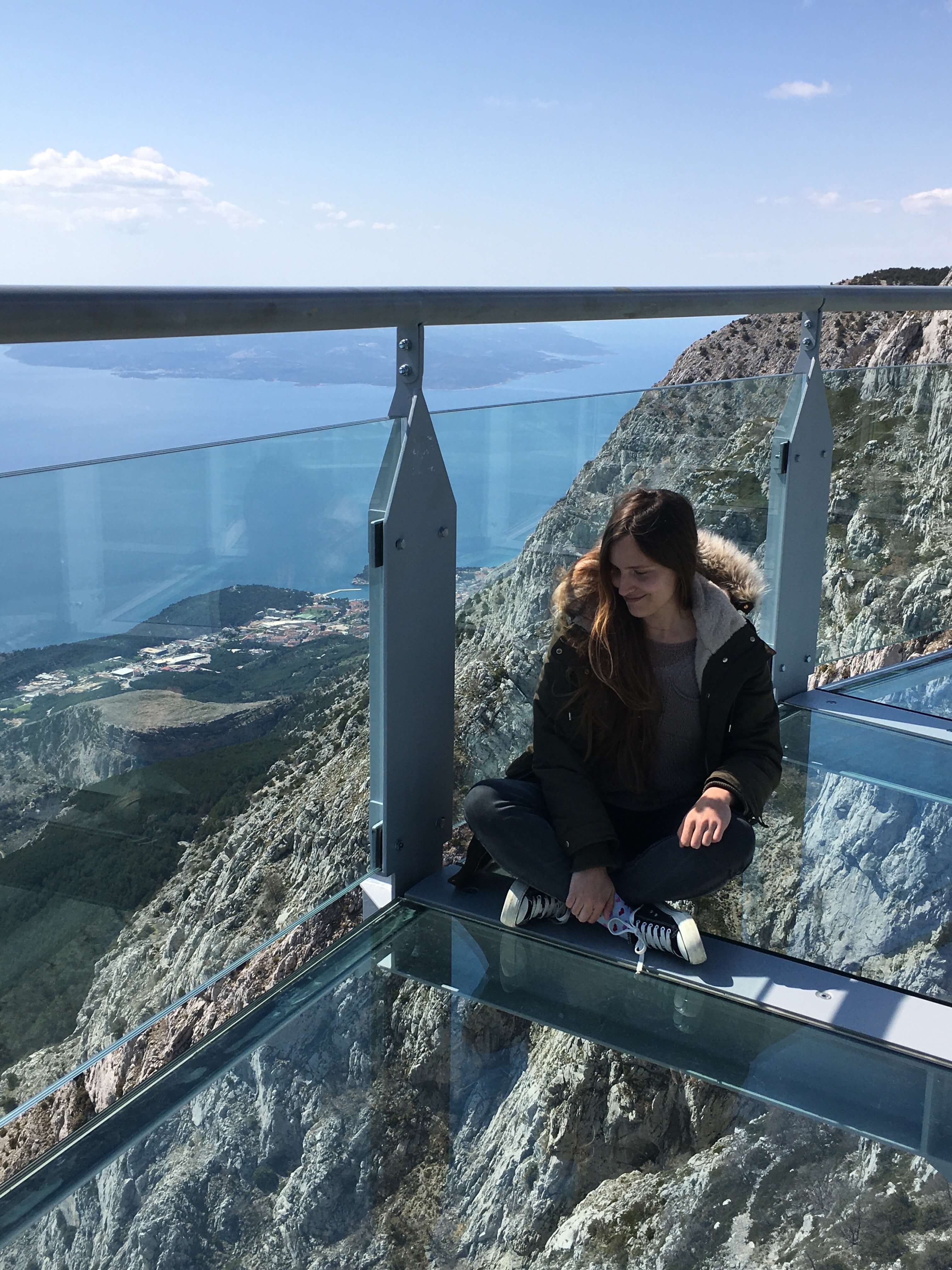
Nadia on the popular Biokovo Skywalk, the same day she met her distant Croatian relatives. (Personal album)
What was your impression when you first arrived?
My first impression of Croatia was that everything was very beautiful and that the people were very friendly. When I met my cousins they seemed to me to be very open and very loving people. The first month I was delighted with everything I saw, it seemed to me that everything was very organized and I felt very safe.
How did that impression evolve over time?
After living here for a year and having moved several times, I also began to see the negative side. All countries have something good and something bad, it is normal. There are things that I don't like and I think that's part of living in the reality of a country and getting out of that stage of infatuation in which I was at the beginning. Now I have a more realistic impression.
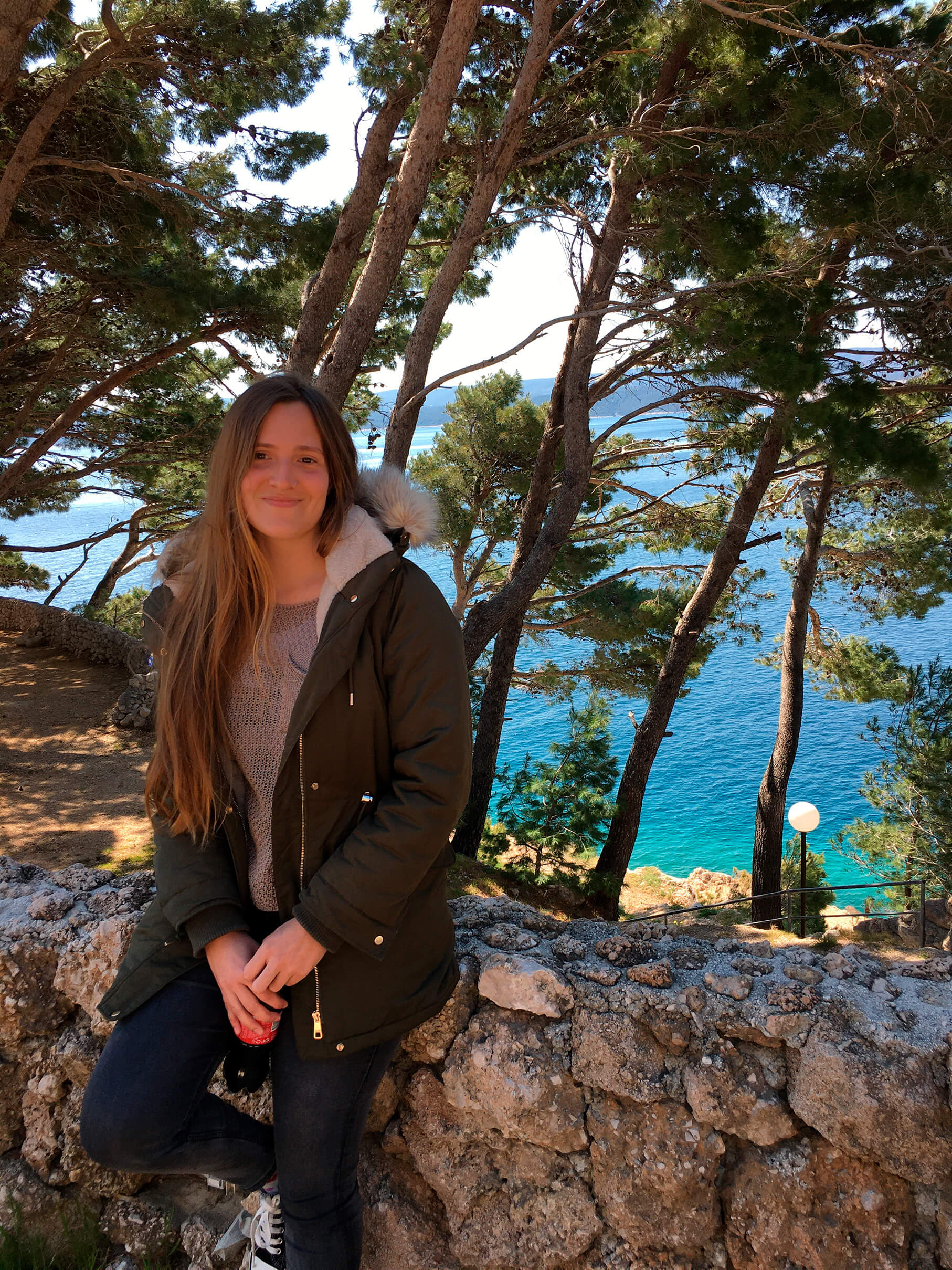
Nadia was born in Buenos Aires, Argentina, in 1994. All of her grandparents are Croatian. (Personal album)
What did you know about your relatives in Croatia?
It was always quite a complicated story because all of my dad's grandparents are Croatian and most of them had a very large family. I know a lot about my great-grandmother Ermenegilda Stanić because they were like twelve siblings and my grandmother went to Argentina because my great-great-grandfather arranged her marriage to a rancher so that she would have a good future in financial terms. When she arrived in Argentina she fell in love with my great-grandfather Duje Runje, a Croatian who worked as a laborer in that ranch. Obviously, it was something very strong for all of his family and my dad always talked to me about the two of them. He doesn't have much information about his paternal great-grandparents because my grandfather, Spiro Milevcic, died when my dad was four years old.
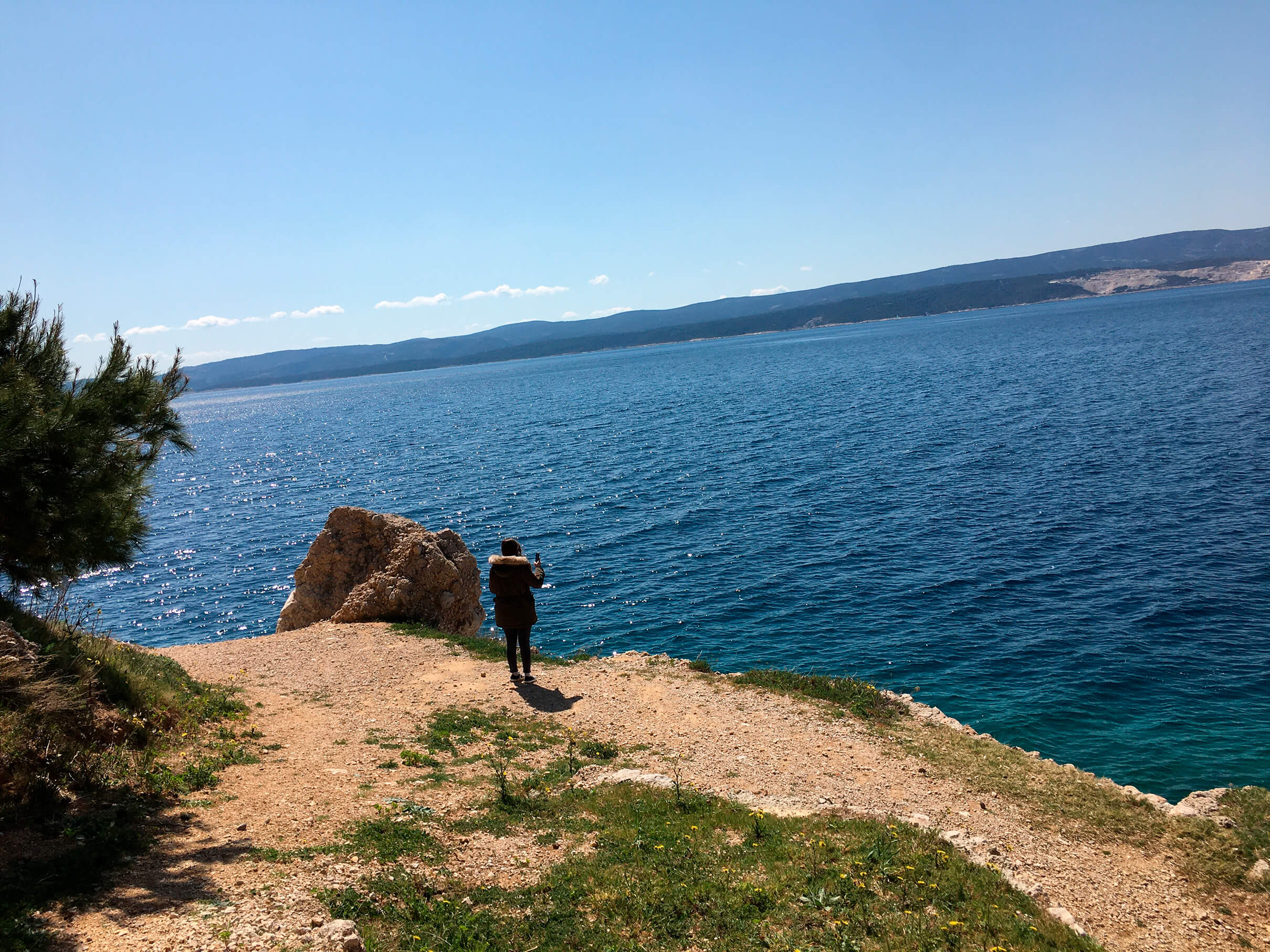
Nadia, who was living and working in Rijeka at the time, decided to travel to Dalmatia for vacation. She hadn't planned to find out about her family on the trip. (Personal album).
Did you have any expectations or plans to meet them?
Yes, my dad has a book that the Stanić family wrote about the descent of the twelve siblings. All the names appear there, including mine. The whole family has it and thanks to that my cousin contacted me from Croatia. It was just the same year that I won the scholarship. She told me that she lived in Rijeka and thanks to that I chose this city as the place where I was going to study for the Croatian language scholarship. This is how I met the descendants of one of the Stanić brothers, but I also knew that she had much more family in Croatia. Last year I didn't meet anyone else because most of them live in Dalmacija.
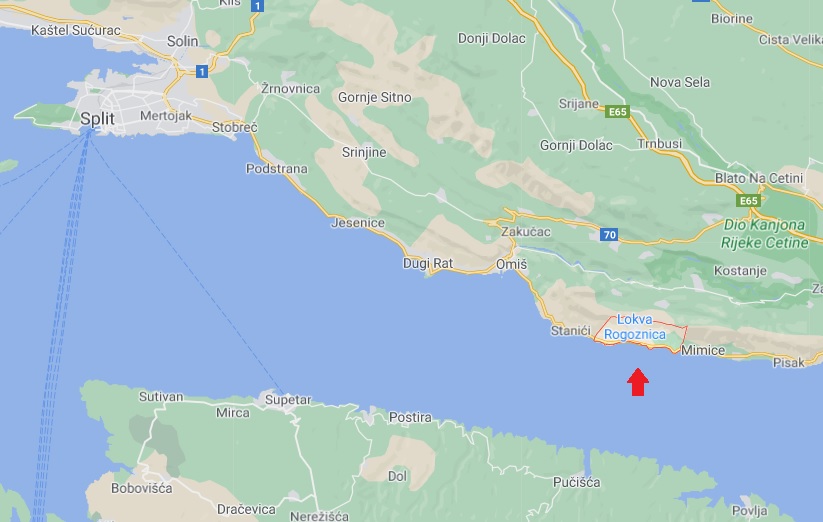
Lokva Rogoznica is a Dalmatian town, one hour away south of Split and 10 minutes away from Omiš. (Google Maps)
The day you met your distant relative, what were you doing and where?
Last month I went on vacation to Split and decided to go to Lokva Rogoznica, a town about an hour away because my great-grandmother was born there. My dad and my Croatian cousins had asked me to go meet him, but it was not my plan to look for anyone there, just take a couple of photos and see what the place was like.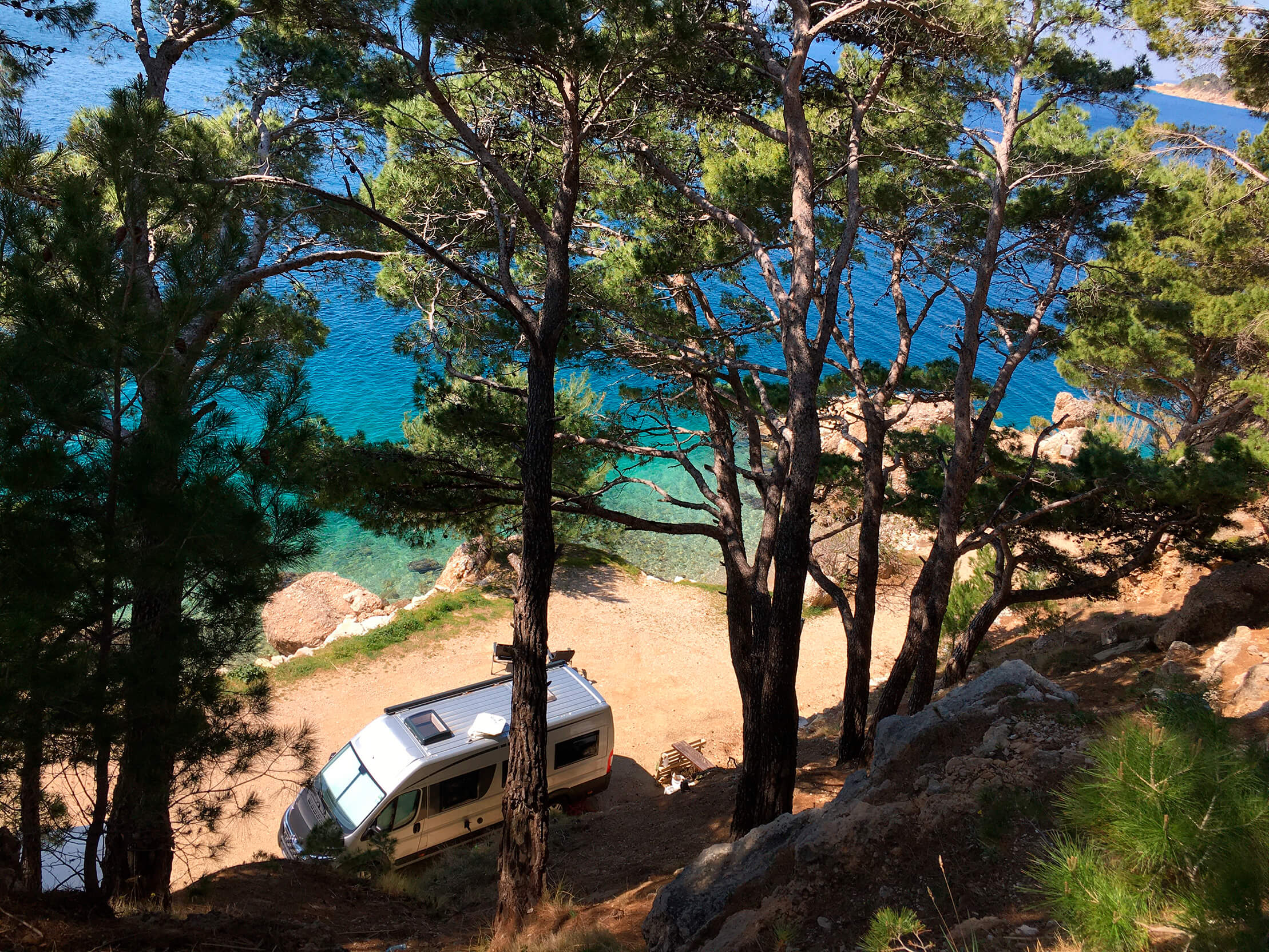
''La Sirena'' autokamp, in Lokva Rogoznica, the town where Nadia's family originated. (Personal album).
How was the encounter?
We stopped at a sign on the route to take a picture of me and we wanted to go down to the beach. I saw that there was a sign for an autokamp and that the beach was private. I remembered my cousins telling me that one of the Stanić was the owner of a campsite somewhere in Dalmacija, but I didn't know where. When we were about to go down to the beach, the owner of the campsite appeared and told me that the beach was private and that we couldn't enter. I don't know why it occurred to me that this could be my relative and I asked him if his last name was Stanić. He said yes and at that moment I told him that we were family because I was Ermenegilda's great-granddaughter. At that moment his face changed completely and he asked me if my great-grandmother had traveled to Argentina. When I said yes, he came closer to me and gave me a hug, and introduced himself as Milan Stanić.
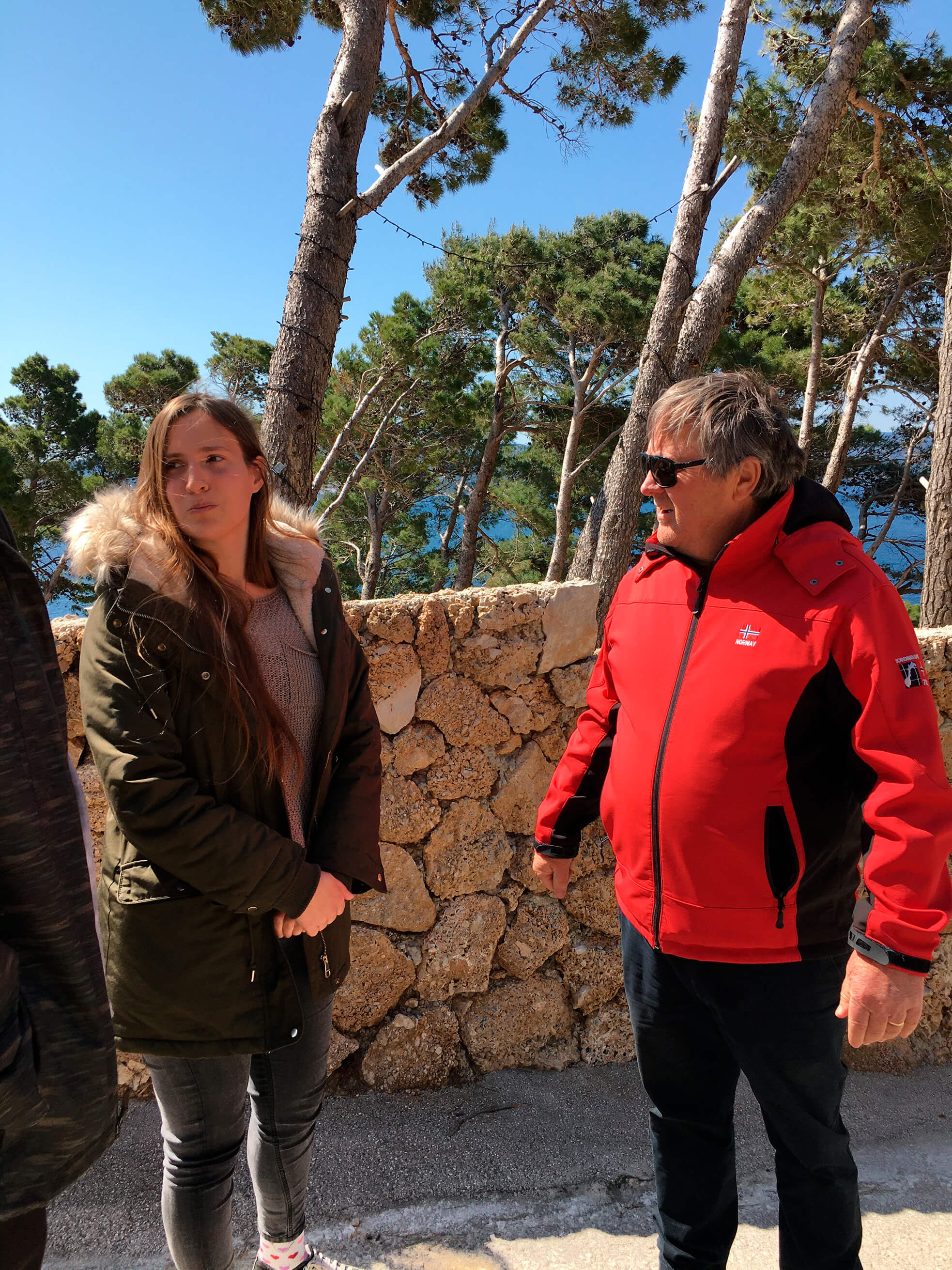
Nadia, soon after she met her distant relative, Milan Stanić. (Personal album)
How did you feel when the last names matched?
I felt very good and very strange at the same time. I was thinking of my dad because his desire was always to meet his Croatian family. I was the first person in my family to return to Croatia and from the first moment, I felt that it was my task to re-establish the bond with the other descendants. I also thought that I had come to take a photo and I ended up leaving with one more piece of my family. I like to think that it was something that had to happen and that it was time for us to meet.
What was his reaction when he found out?
He was very excited and very happy. From the first moment, he was very open with me and he introduced me to all of his family. That day we had lunch and dinner together. It was a very nice moment because all his daughters and his wife welcomed me very well and everyone was interested in talking to me.
Are you still in touch with him?
We don't talk every day, but I have his number and my cousin’s Facebook, so I can let them know the day I'm going to visit them again. They know that I am living in Rijeka and that I am working, but that at the end of the summer I am going to travel with my brother so that he can meet them too.
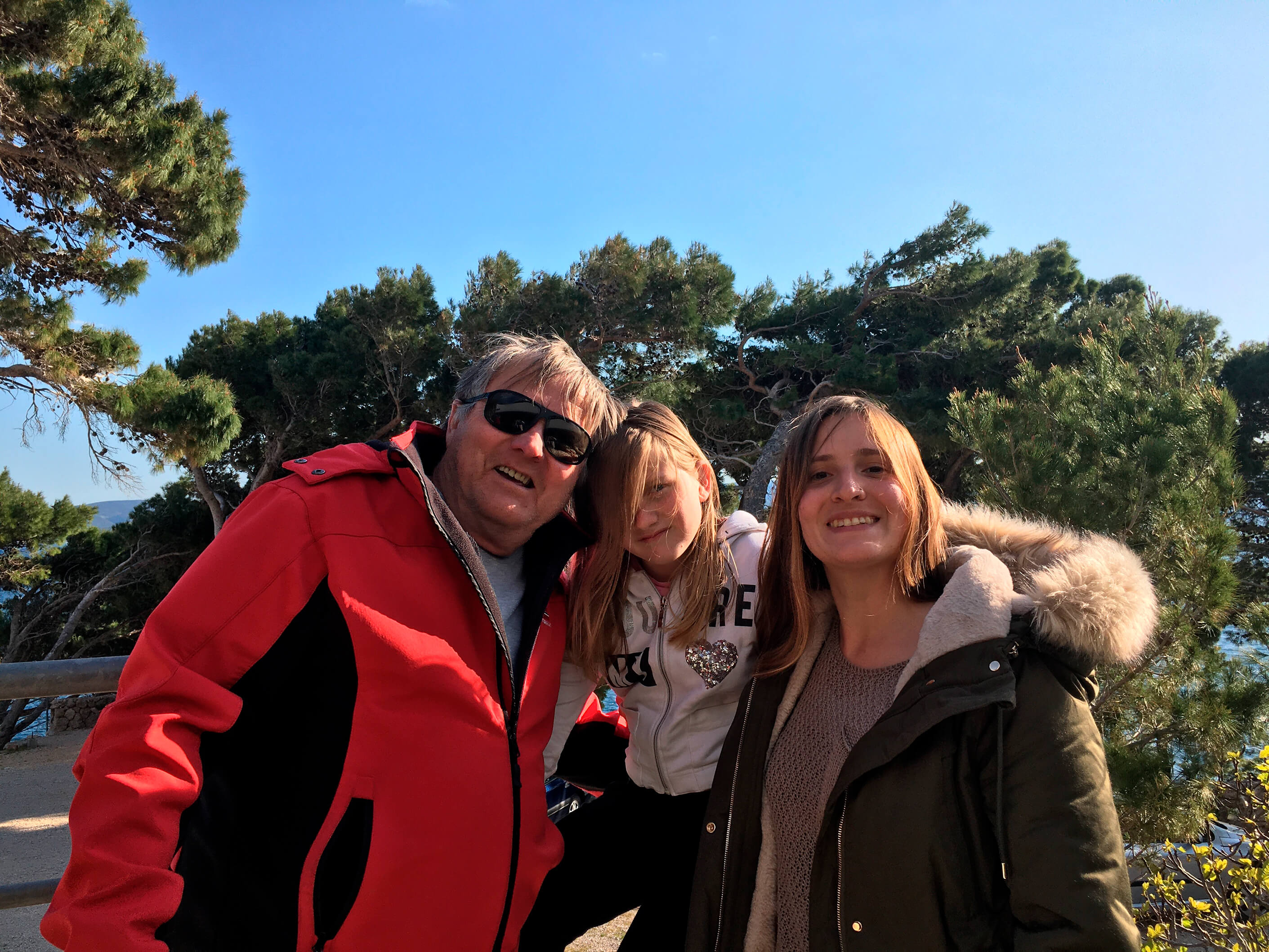
Milan, his daughter, and Nadia. (Personal album)
What is your goal in Croatia? Would you like to stay?
My idea of Croatia totally changed over time. When I arrived I planned to stay for only four months to study, but then I applied again for a second semester. I think that the decision to reapply for the scholarship was no longer motivated by the desire to know another culture, but was related to the fact that I felt good in Croatia and that I still did not want to go back to Argentina. Nowadays I am more established with the Croatian language and culture, but I cannot tell you that I want to stay permanently. I feel a strong connection to Croatia, but I also have my best friends and family in Argentina. Every day I miss my country and the people who live there and that is why I know that I will return to my country at some point. I sincerely feel that one half is here and another half is there in Argentina and for that reason, I would like to go and come back, spend some time in each country. I think it is a decision that is made every day. I can only tell you that today I choose to stay here.
The Croatian diaspora in South America is one of the largest in the world, and we at Total Croatia and Total Croatia News are committed to developing more on the subject in the coming months. If you belong to the Croatian diaspora in South America and want to share with us a story of reuniting with your distant relatives or your experience living in the land of your ancestors, you can send an email to This email address is being protected from spambots. You need JavaScript enabled to view it..
For more about the Croatian diaspora in South America, visit our dedicated page here.
Croatian Culinary Heritage to be Protected with European Union Funds
April the 13th, 2021 - CUHaCHA might seem like a strange word and a bit of a mouthful to try to pronounce, but this project is set to set just how important Croatian culinary heritage is firmly in stone.
As Poslovni Dnevnik/Marta Duic writes, aware that traditional food plays a major role in the tradition and folklore of countries and is the basis of cultural heritage, the Zadar County Agency for Rural Development - AGRRA, the Ministry of Education, Science, Culture and Sports of the Herzegovina-Neretva County-Canton, the Tivat Municipality and Zadar County have jointly launched the CUHaCHA project.
As Ana Zubcic, AGRRA's international cooperation project manager, explained, tradition, Croatian cultural heritage and that of other surrounding countries, gastronomy and catering/hospitality are inextricably intertwined in this region. In addition, Zubcic pointed out, local cuisine and local products can encourage both innovation and promotion, and ultimately ensure further development at the regional and global level, this further improving the overall tourist offer.
Accordingly, the main goal of the "CUHaCHA" project is to strengthen and preserve the identity of Croatian culinary heritage and the common culinary heritage of the programme area, as well as to further contribute to the development of tourism, and it's a project worth 710,946.94 euros in total, of which the EU is co-financing 604,304.89 euros.
"Our general goal is to revive those dishes through gastronomy and traditional dishes that are slowly falling into oblivion and thus provide tourists the opportunity to experience the authentic flavours of the region. Food has played a key role in the tradition of our area for thousands of years now and remains an important part of our cultural heritage. In this way, we not only work to promote the destination and our traditions, but also offer an opportunity for innovation in this field,'' added Zubcic.
The project started back in August last year, and the first meeting of the partners involved was held in November, when the first project activities and plans were initially agreed.
Namely, as Zubcic revealed, as part of the project, common culinary heritage trails will be developed to strengthen and diversify the tourist offer, a culinary heritage monograph will be published, and training will be held for all service providers to ensure better culinary heritage management.
The project will also arrange traditional kitchens with the aim of promoting culinary heritage. Unfortunately, like the majority of other things, this project was also slowed down by the ongoing pandemic, but a culinary heritage survey is planned for the next six months.
"By researching all three areas, we'll find out what these dishes are, and then revive them and offer them in restaurants and in the general tourist offer. We believe that this will encourage farmers as well, because tradition and home-grown food are the key to this story.
The idea is that those who already offer food, if they don't already offer traditional food, for them to go in that direction,'' concluded Zubcic, adding that they will soon adapt and equip a traditional kitchen where training sessions for caterers, chefs and restaurant managers will be held. One of the last steps will be a virtual gastro trail.
For more on Croatian culinary heritage and local dishes, check out or dedicated section.
Robert Jerin, Tracing Croatian Heritage and Genealogy for 30 Years
February 11, 2021 - Looking for your Croatian roots? Meet Robert Jerin, who has helped countless people connect with their ancestral homeland over the last 30 years.
The wider Croatian family is one of the most diverse on the planet, located in almost every corner of the world. Many people of Croatian origin have only a tenuous connection to their roots of the country their ancestors emigrated from generations and centuries ago.
And many are curious about their roots. Meet Robert Jerin, one of the nicest guys I have met in that wider Croatian family, and a man who has done perhaps more than anyone to connect people with their Croatian heritage and roots, through a combination of heritage tours, a Croatian genealogy guide, as well as an excellent Facebook group, Croatian Heritage and Genealogy.
I met Robert Jerin a couple of years ago for a cold one in Zagreb during one of his heritage tours. We have kept in touch, and I am grateful for his time in taking part in this email interview.
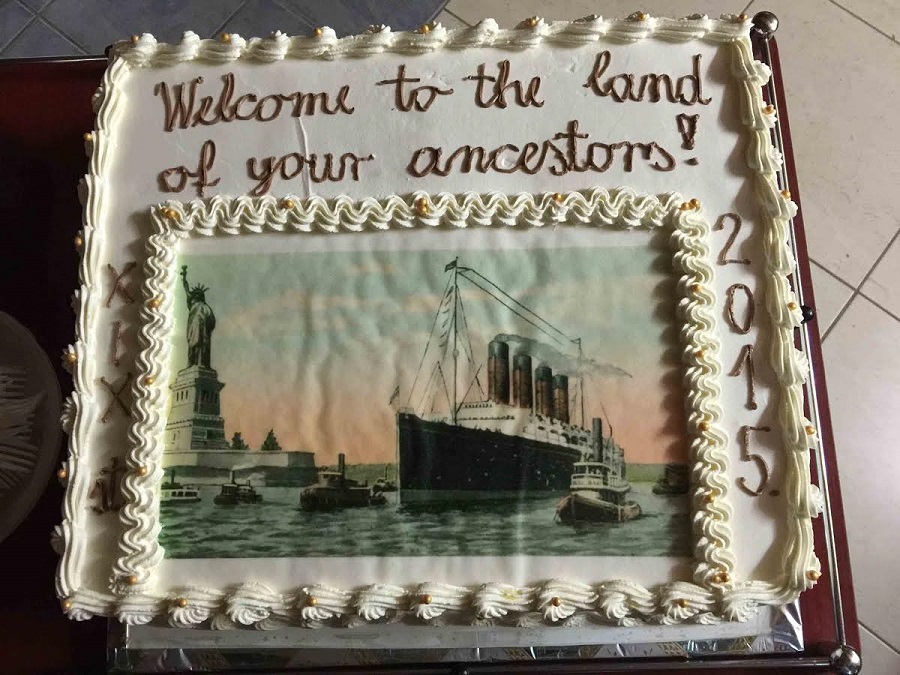
1. You have been running the popular Croatian Heritage and Genealogy Facebook group for several years now. Tell us firstly about your Croatian connection, and why did you decide to start the group?
My connection to Croatia is through my maternal grandparents, who came from the Karlovac/Ozalj area of Croatia. During my growing up years, I spent a great deal of time with them on their farm in Pennsylvania. My mother enrolled me at 6 months old in the Croatian Fraternal Union. For many years I paid little attention to the CFU Croatian newspaper but sometime around 1985 I began to read historical articles. Just before the Homeland War, I sought my Grandparents' birth records, visiting the old Yugoslav Consulate in Cleveland. During that visit, the men standing around kept a watchful eye on me, little did I know that Cleveland was a hotbed for Croatian nationalists.
Then when the Homeland War broke out I emersed myself in all things Croatian: enrolling my children in a Croatian Tamburica group, helping out at our Croatian Heritage Museum in Cleveland, packing humanitarian containers going to Croatia and becoming active in a local Croatian Newspaper, the Croatian Voice. Our family sponsored war orphans in Croatia and we sponsored Croatian War Refugees coming to America. Our first visit was in 1997, which is hard to describe, as I walked between my ancestral villages. Since that time we have been back to Croatia nearly every year since 2005 taking over 700 people on Heritage Tours, where our goal is to connect them with their ancestral culture and in many cases help them find family.
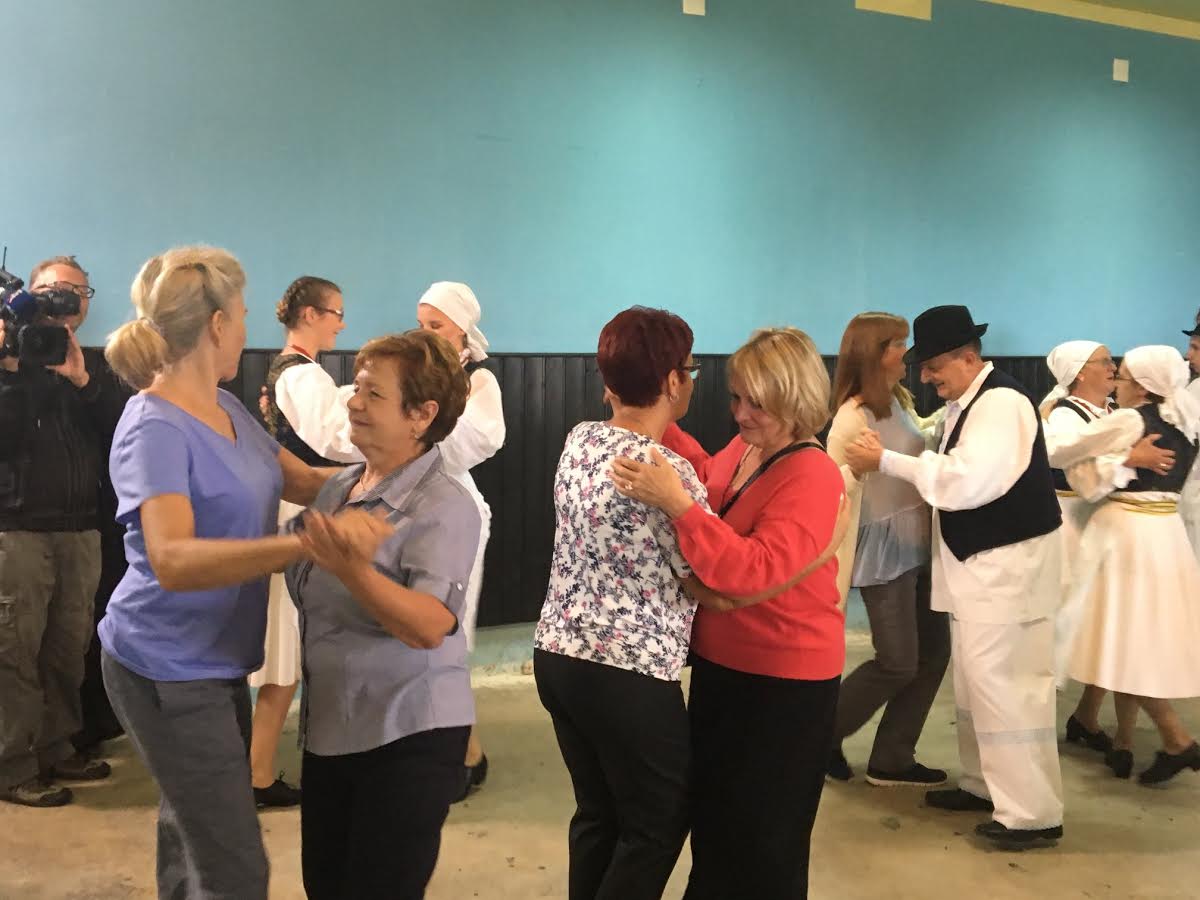
(Bonding with the locals in Gornje Bukovlje)
2. You also have various services for people trying to trace their Croatian heritage. Tell us about those.
The past 30 years have been a learning and sharing experience. As I delved into Croatian genealogy, I found I was able to help others, first on the old Croatian Ancestry forums and later on Facebook. Nowadays I offer 1 or 2 Heritage Tours to Croatia, Croatian Genealogy Seminars in various cities in the US, a Croatian Genealogy Handbook which I sell online in PDF format, and can offer genealogy services to many people gathering info to help them build a family tree.
Interestingly each of these came about from answering questions. First, someone suggested I do a seminar for the group, then someone suggested I take them to Croatia.
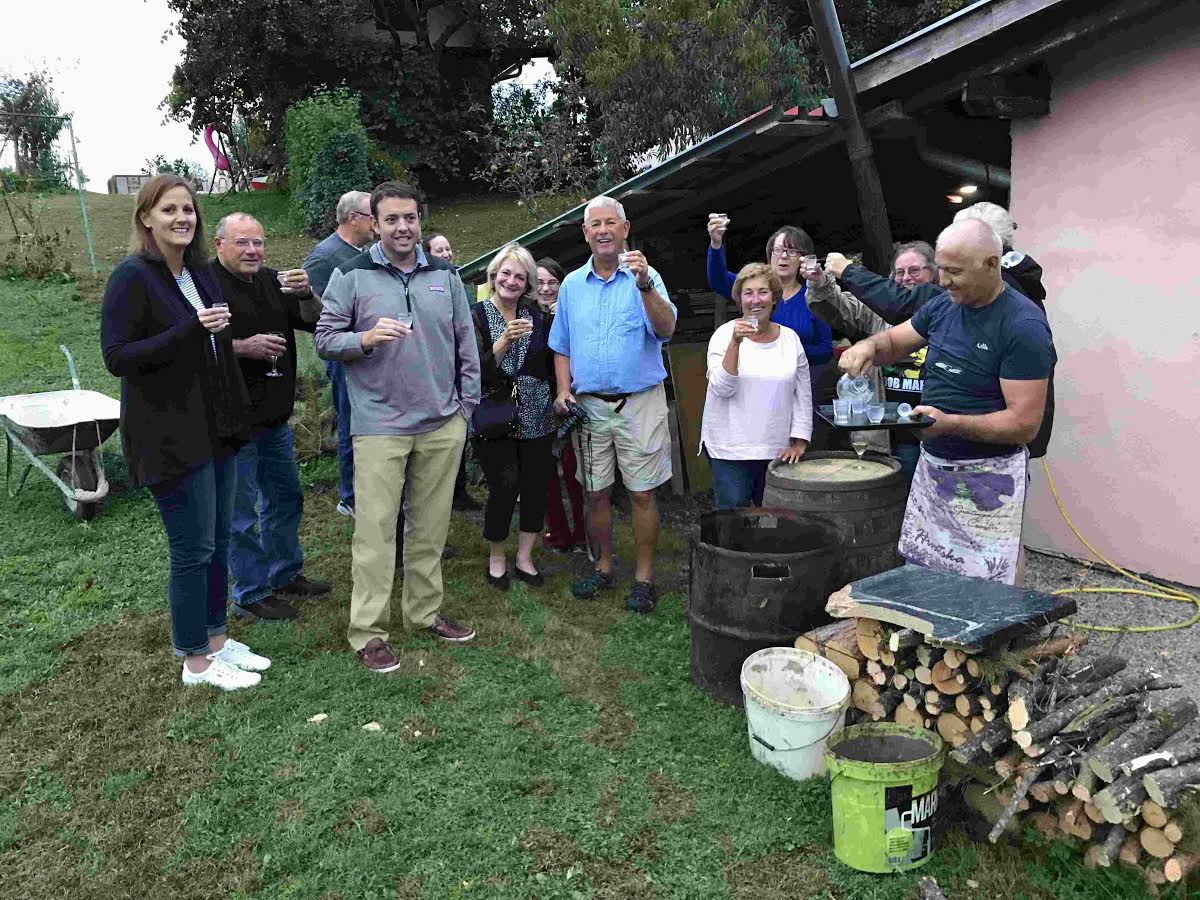
(Rakija stop at Plitvice Lakes with the Rubcic family)
3. Heritage tours must be incredibly uplifting experiences, as you bring people to the Croatian villages and homes of their ancestors. What does a typical tour look like?
Ah yes, the tours are very special. I still recall our first Heritage Tour in 2005. I had no idea how the tour would roll out, but as we went along people began to bring paperwork for their ancestors in America. We connected several people on that tour with their ancestral villages. And we were interviewed by Dobro Jutro Hrvatska during our visit to the State Archive. Since then we have been interviewed in print media, TV and radio.
Our typical tour includes famous places that people have heard about and think they need to see, such as Dubrovnik, Split, the common tourist places. But we try to introduce people places off the beaten path such as Smiljan the birthplace of Nikola Tesla, Lekenik, the Croatian Parliament, the famous but defunct resort of Kupari, the Lippizaner Stud farm at Djakovo, the Church of the Croatian Martyrs in Udbina, the Homeland War Cemetery in Vukovar, several castles including ones at Ozalj, Knin, Varazdin, Velike Tabor and Trakoscan, ethno selos at Trg/Ozalj, Kumrovec, Pakovo selo near Drnis, the pilgrimage villages of Marija Bistrica and Medjugorje, and one of three places in Croatia where Fiddler on the Roof was filmed, backroads in Dalmatinska Zagorje and a place we visit yearly the non-touristic village of Gornje Bukovlje where the local Ladies Club treats us to a day of music, dancing, eating and drinking.
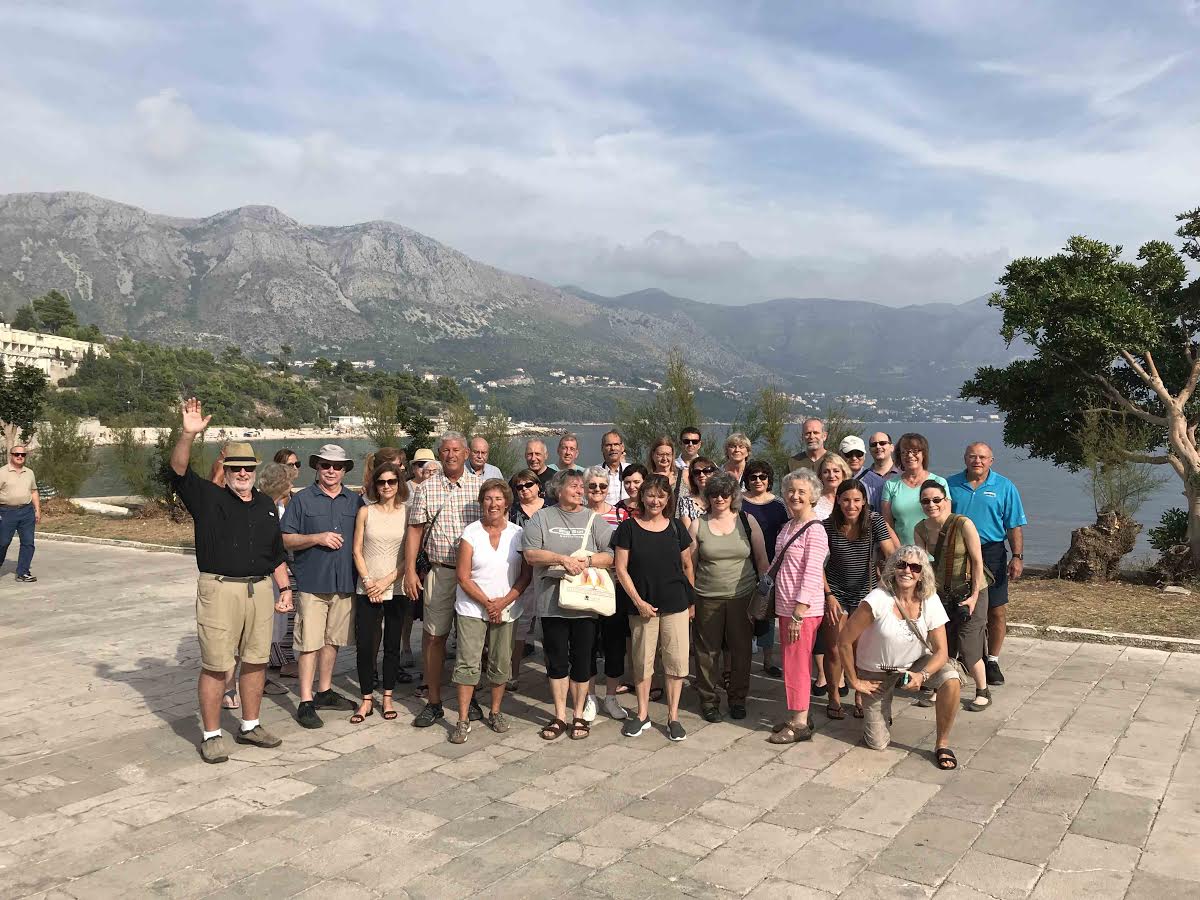
I emphasize to people that this place is as close as they will come to the Croatia of their ancestor’s day. We will even make surprise visits to ancestral villages of someone in our tour group if we are close. We set aside free time and encourage people to visit their ancestral villages, which we can help plan. And for those who want to do research, we have time planned on each tours at the State Archive in Zagreb. And I always seek out a place where we can enjoy traditional music, customs and food, such as Sarma. The tours bring out emotional responses from people.
The last several years we have added a week-long cruise on the Adriatic, employing small family-owned ships. These small ships are a great way to see the Croatian scenery, as you have a 180-degree view. We sail every morning stopping for lunch and a swim and then dock in the late afternoon in a historic port where we spend the night. Carrying about 38 passengers, breakfast and lunch service, a bar, a hot tube we reserve the entire boat for our group.
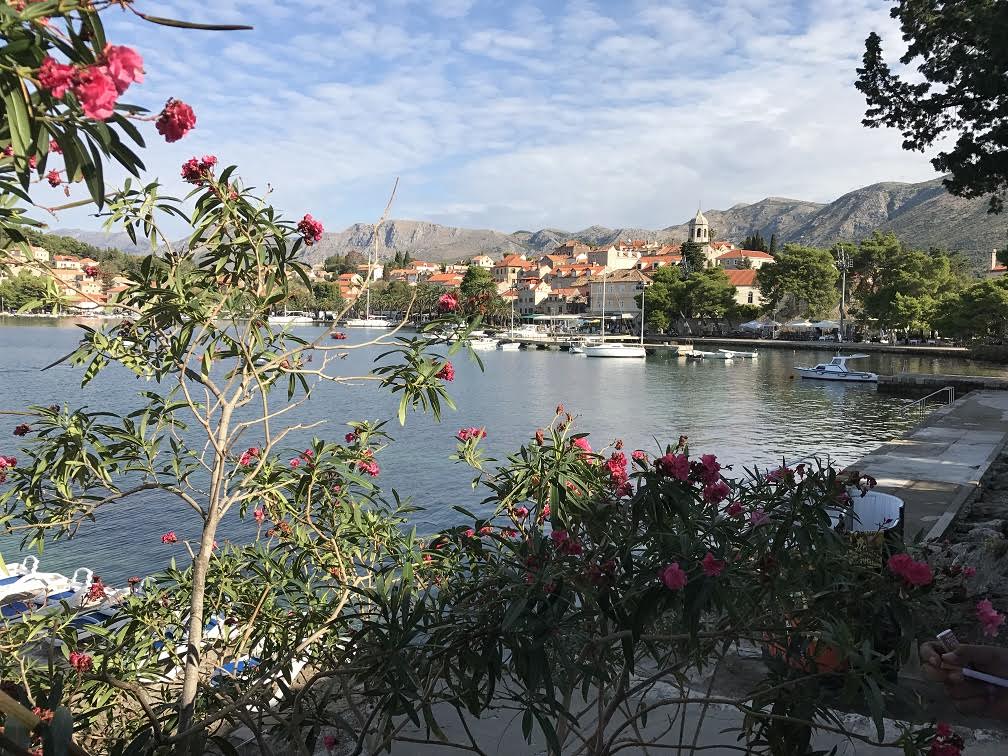
(Cavtat)
4. I am sure you have witnessed some amazing connections of people with their past on these tours. Any particular favourite stories and memories?
We have dozens of touching stories, having help connect people with long-forgotten family in Croatia.
A good example of the emotion of our tour group can be found in this Andrew Norris (a transplant from the UK), who lives much of the year in Gornje Bukovlje. This video is from our visit to Gornje Bukovlje in 2012.
One of my all-time favorites was a few years ago when we had a lady in our group, whom I had helped find her ancestral village of Jazevica. My Zagreb friend, Dejan Perhat, had located her family. On our way back from Osijek, we received a call from Dejan telling us her family invited the entire group to stop at their home in Jazevica. What an experience, they laid out their best sunka, kobasica, sir, kruh, kolache and of course a never-ending supply of various Croatian liqueurs in an outdoor pavilion. There was not a dry eye that day. Even those who had not planned a visit to their ancestral villages were inspired to do so.
I would be remiss to not mention others in Croatia who have helped: Sanja Frigan-Cihua, Lidija Sambunjak, my dear departed from Miro Caic, Zoran Stupar, Alen Miocevic (our guide since 2005) and our friends from Hrvatska Matica Mirjana Piskulic, Branka Bezic-Filipovic and Hrvoje Salopek.
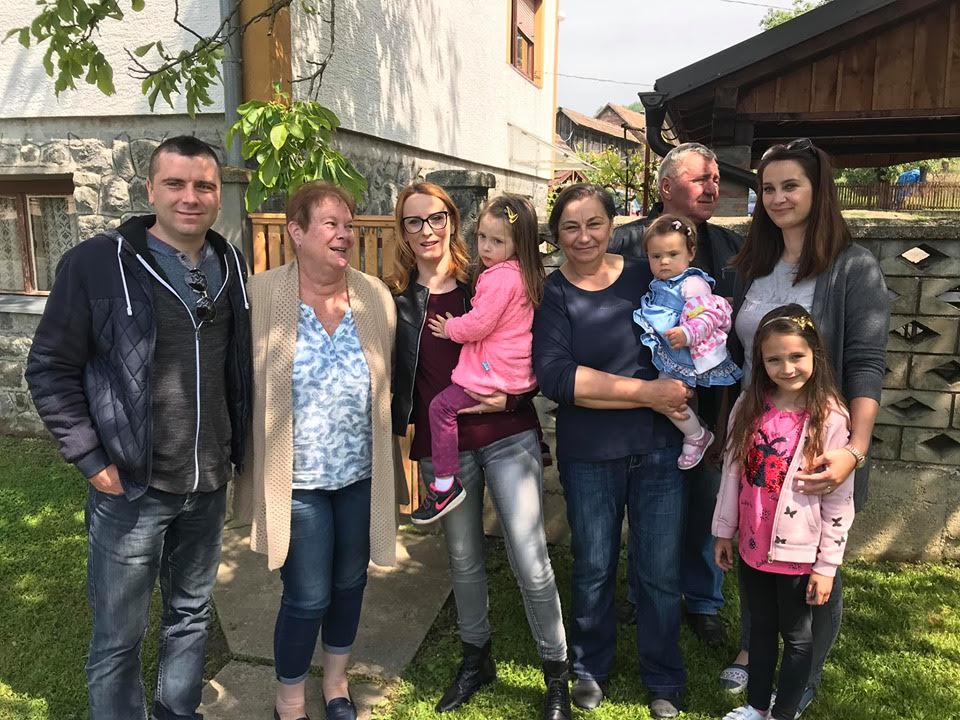
(Ancestral visit to Jazevica)
5. You have performed great work helping people trace their Croatian roots online as well. What are the most common enquiries and requests for help?
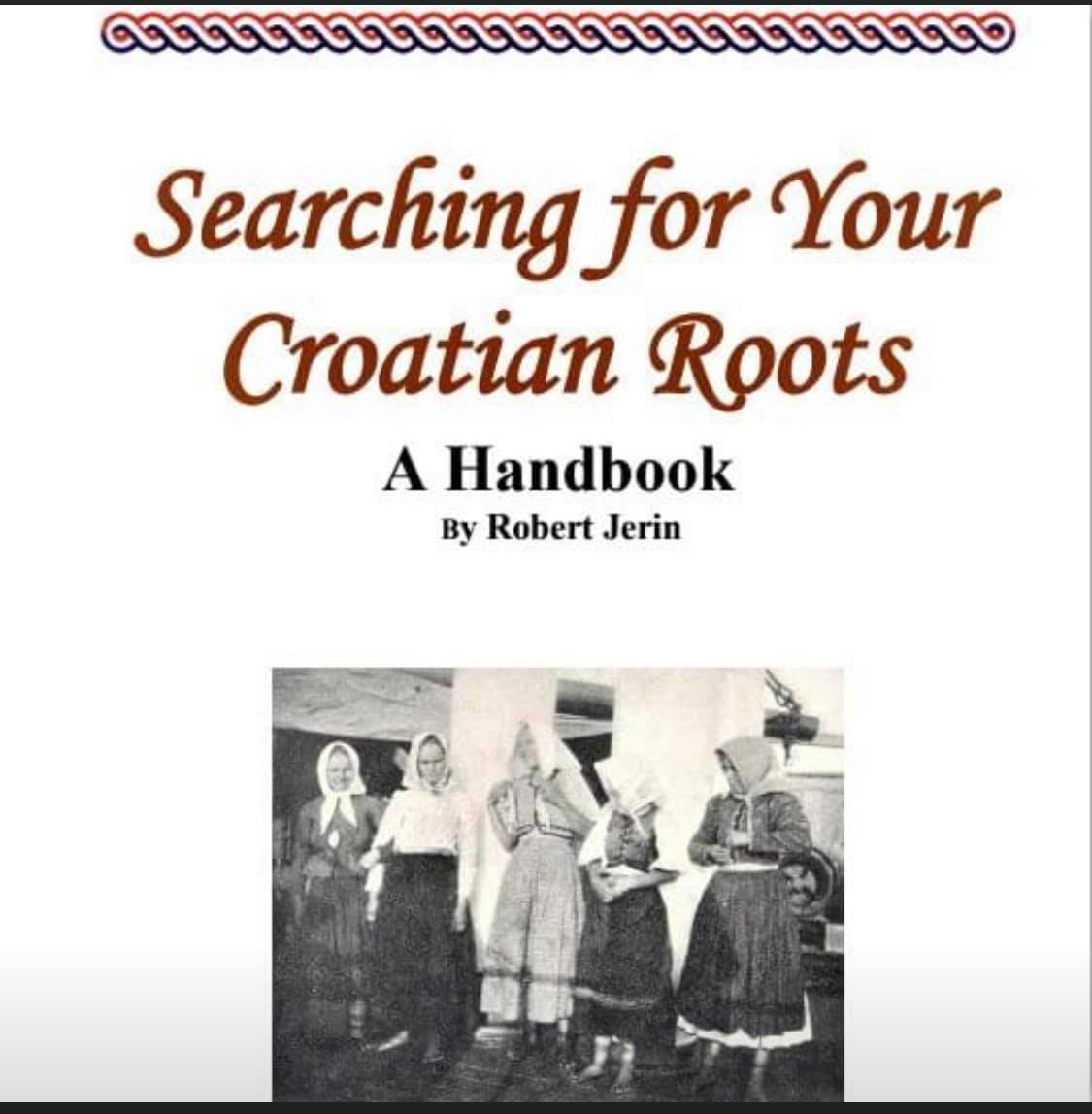
Many people begin by simply asking about a surname, little do they realize the surname may be quite common in Croatia. After some prodding they come up with more details. In most cases we have a high degree of success, even though they may only know the Anglicized surname. Funny that many people say their ancestors came from Zagreb. But in fact Zagreb was a well-off city that offered employment, thus very, very few left that city for America in the early 20th Century. Most came from small villages seeking to make money in America in hopes to return home and buy land. Perhaps 25% or less actually fulfilled that goal as most found a new life in America. I always tell people they need to work backwards from themselves, parents, grandparents in order to establish a town or village of origin in Croatia.
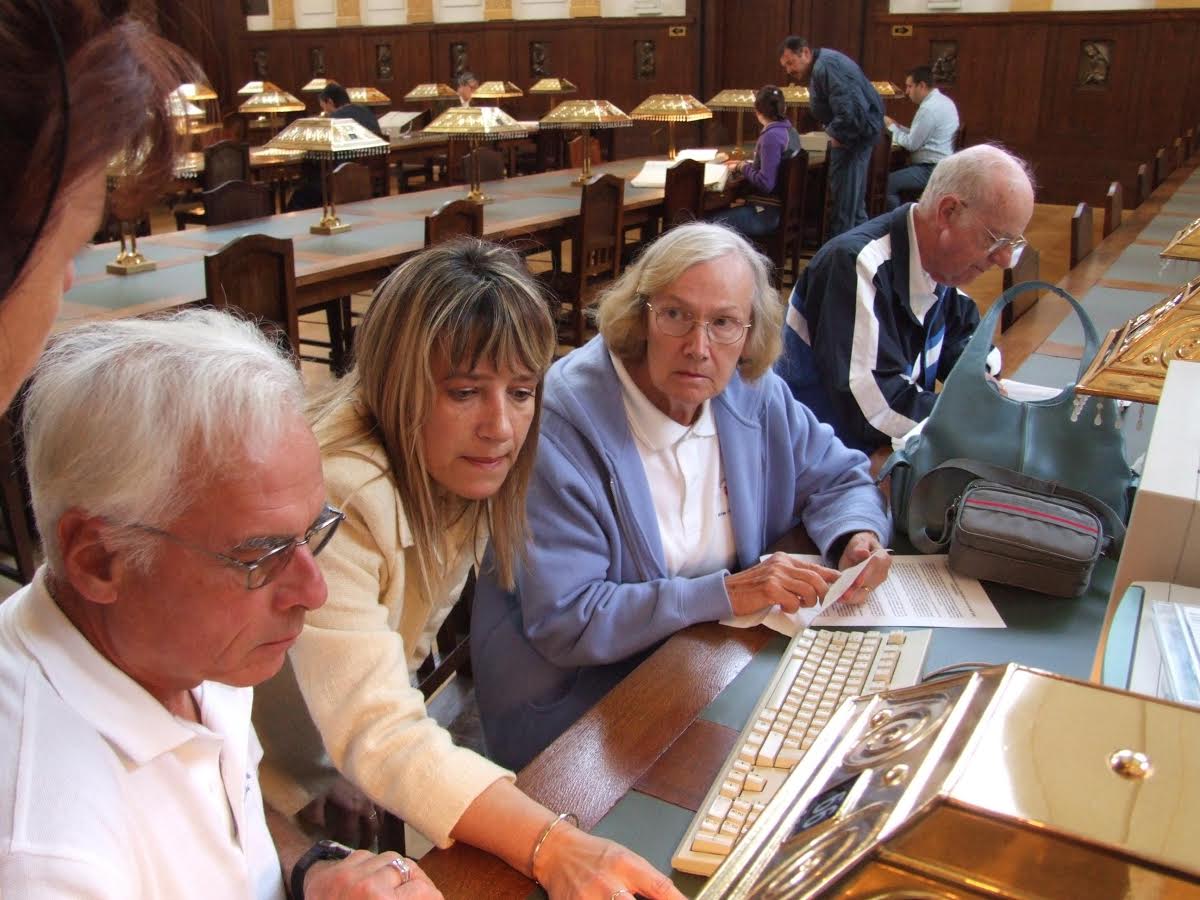
(Heritage research at Zagreb State Archives)
6. Tell us about moderating the Facebook group. Anything that focuses on the past in Croatian is almost always contentious, but you manage to keep things very civil.
This is sometimes a challenge but most of the people in our group are very kind and helpful. While I certainly can discuss politics I have banned political discussion from the group. Everyone now and then we have someone object, but the rules are clearly stated in the welcome to the group. It is not always easy, having been called a censor (yes, I am sometimes), a communist, a fascist among other unmentionable names. But when I part company with members who do not agree with the purpose of our group, I always try to leave them on a good note.
I am surprised how even some Croatian born people are not as well versed in their history as one would imagine…. But again our group is to share such knowledge.
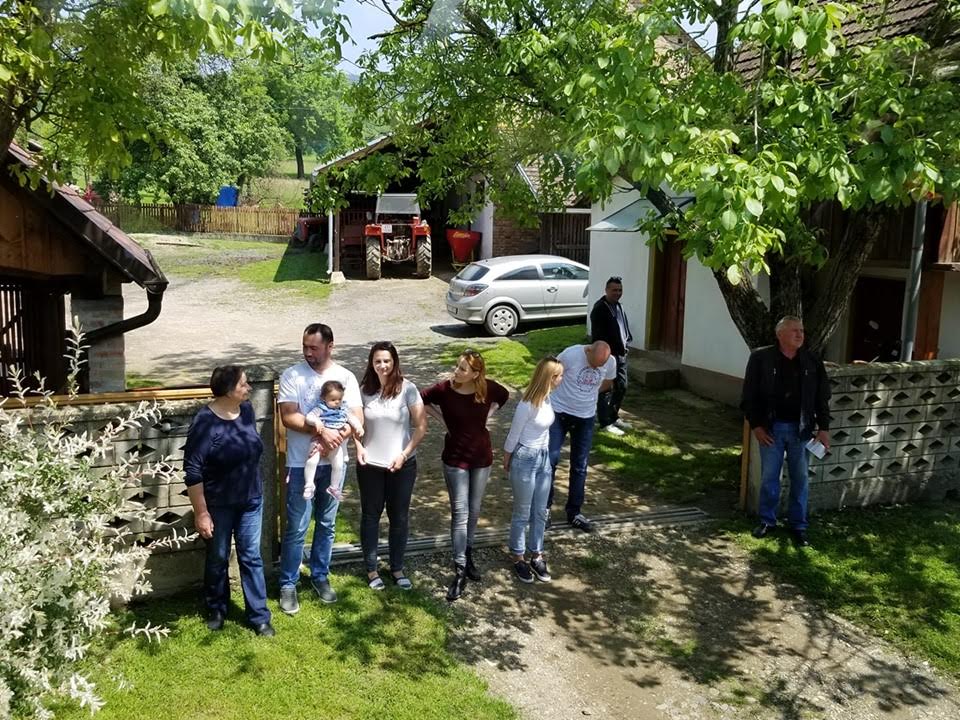
7. How closely do you follow daily events in Croatia, and how do you view Croatia today from your perspective in the States?
I get a Google News Feed every day of Croatian news, including Total Croatia News. And I Skype every week with my friend and guide in Rijeka, Alen Miocevic. So I follow the news and events somewhat closely.
I view Croatia as a place of great possibilities which may be a bit stymied by negative attitudes of some and a bureaucracy which has a long history in Croatia dating back to the days of the Austro-Hungarian Empire. But I view Croatia as a place that is improving and trying to find its place among the larger countries of the world. As I am wont to say, korak po korak (step by step).
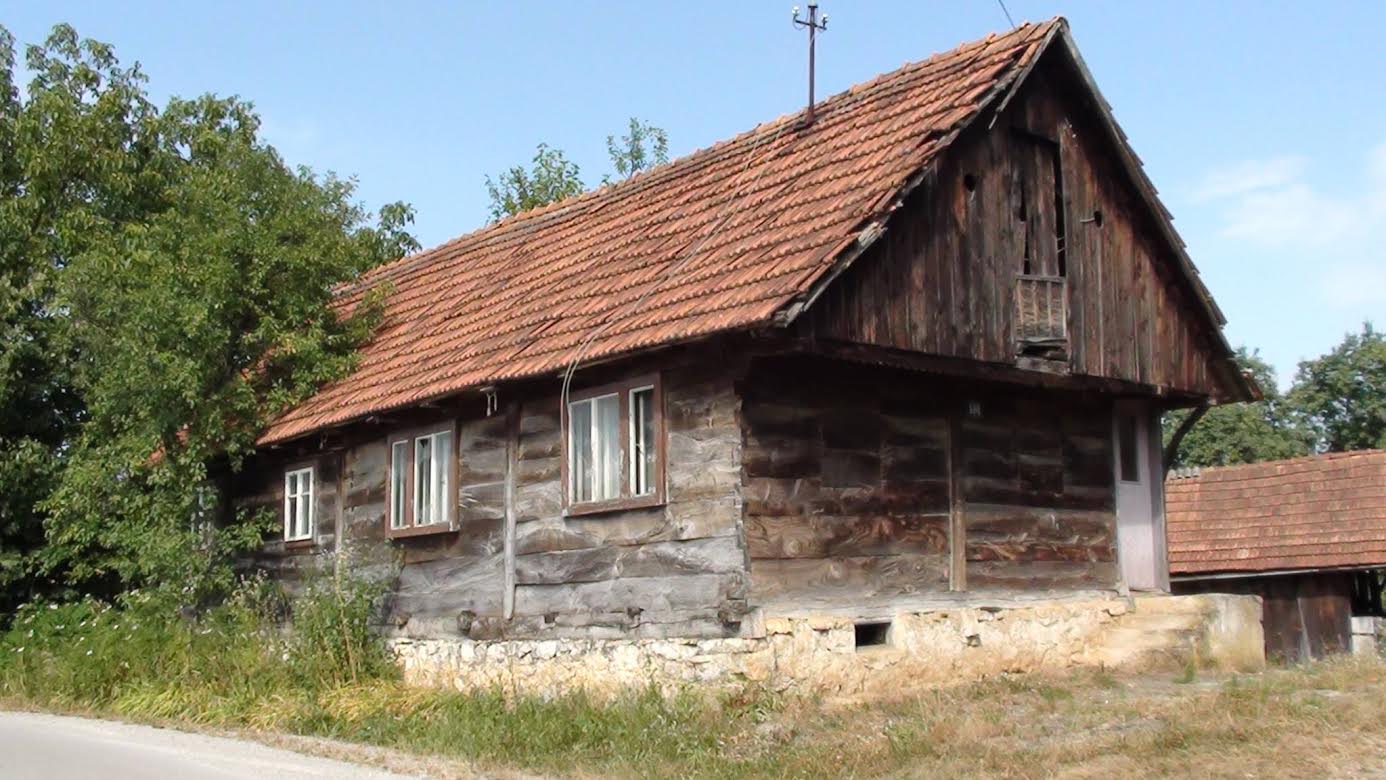
8. And finally, favourite place in Croatia, and why?
Oh my this is an unfair question. We have many favorite places in Croatia, but always feel like we are coming home when we visit Gornje Bukovlje. While I enjoy the famous places, I love visiting places off the beaten path. we get to visit many ancestral and interesting places off the beaten path. Sosice in Zumerak, land of the Uskoks, Delnice frog museum, Lokve, Mrkopalj, Lič and Prigorje. These were surprise stops for people whose ancestors were born there. All these places have some significant place in Croatian history but are largely bypassed by tour groups. Occasionally we will surprise the group with a roadside picnic where we enjoy sampling Croatian food and drink One of my favorite things is to get up before the tour group and take walks. I am amazed at some of the places I find and wonder why tour guides don’t take us to those places, but I guess they like taking groups to Lotroscak Tower at noon for the firing of the cannon.
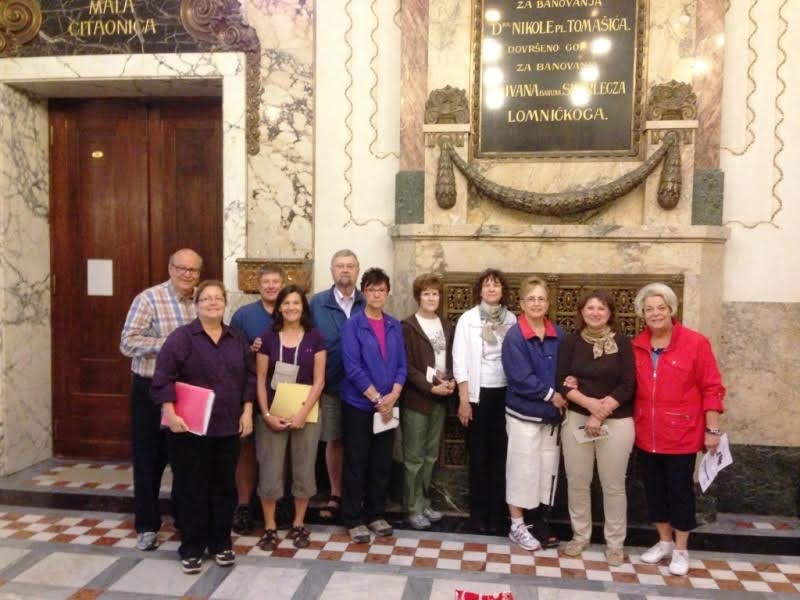
You can follow the excellent Croatian Heritage and Genealogy Facebook group here.
And if you are interested in joining one of the 2021 heritage tours to discover your Croatian roots, here are the links to the groups in July and in September.
For more from the Croatian diaspora, follow the dedicated TCN section.


